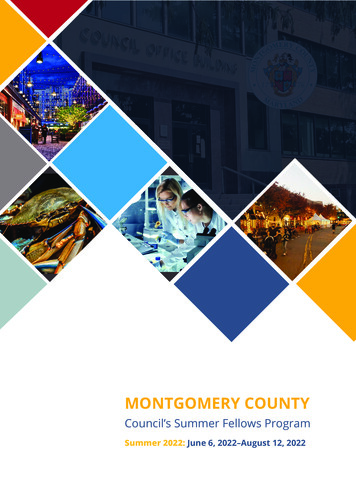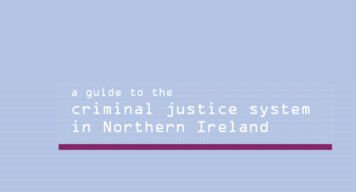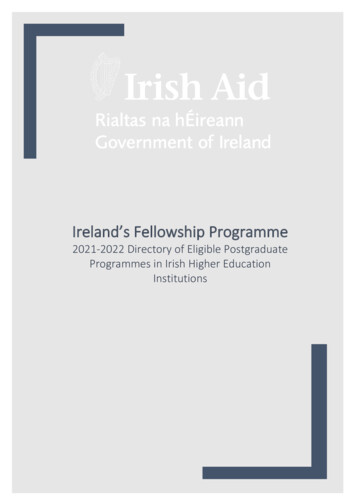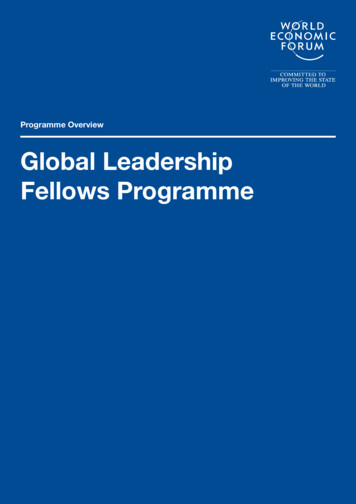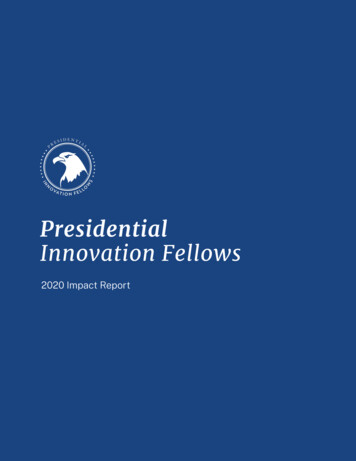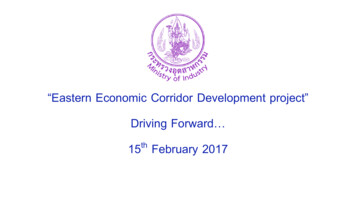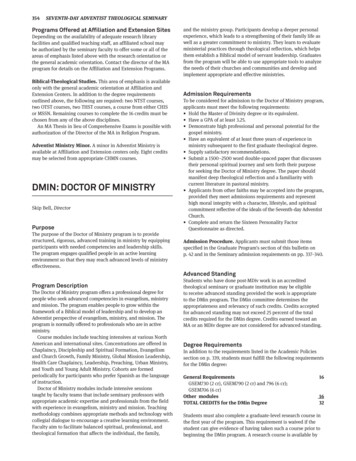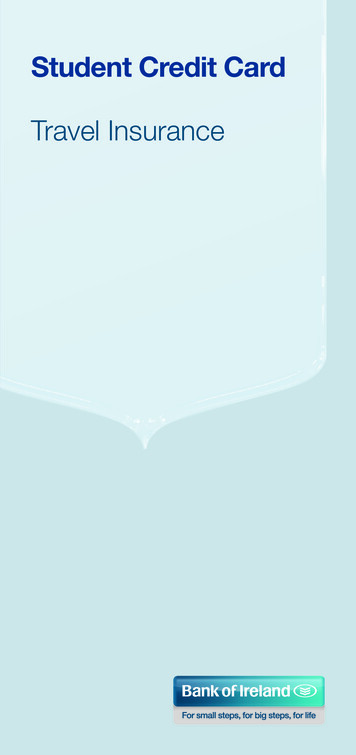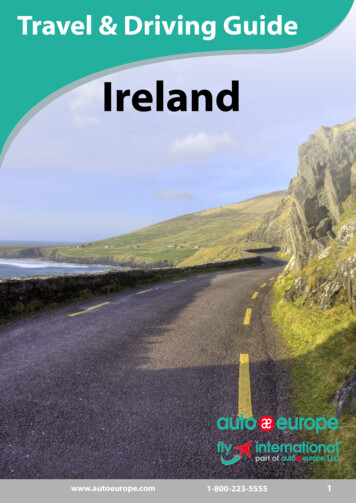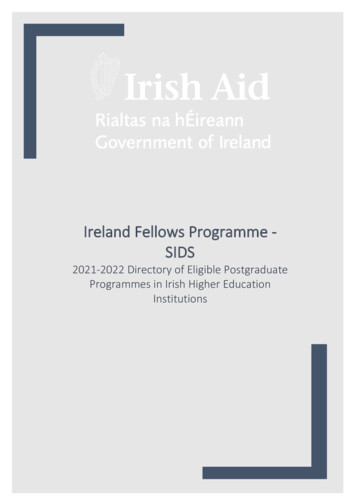
Transcription
Ireland Fellows Programme SIDS2021-2022 Directory of Eligible PostgraduateProgrammes in Irish Higher EducationInstitutions
Important Information for ApplicantsABOUT THIS DIRECTORYThis directory should be read alongside the guidance notes and the programme application form. These notesexplain the application process and you are advised to study them carefully.On your application form, you are required to identify the specific postgraduate programme(s) in order ofpreference, which you are interested in undertaking, based on the information in this directory and the latestdetails provided by the relevant institution. You should not rely solely on the information in this document, as theinformation about programmes provided by institutions at the time of publishing this directory may be subject tochange. Before preparing or submitting an application, you are advised to check all details with the onlineinformation provided by the college. You should particularly ensure that you meet all eligibility requirementsfor the selected programme(s). It is also important that you research the institution(s) you propose to study at toensure that it is a good fit for you and will meet your expectations.Information on making a programme application will be provided to candidates shortlisted by the Embassy ofIreland in March 2021. Fellowship applicants are advised NOT to apply for any programmes in Ireland until afterthey have been shortlisted for a Fellowship award following interviews (Stage 3). Please note that applicationfees will be paid by the Department of Foreign Affairs for shortlisted candidates only. Reimbursements will not bemade where a shortlisted candidate applies for a programme before being formally approved by the Embassy ofIreland to do so.FELLOWSHIP PROGRAMMES INCLUDEDThis directory covers all programmes offered under the Ireland Fellows Programme – SIDS.WEB ADDRESSESThroughout the listings, many long web addresses for programme information have been shortened, for example:www.bit.ly/qEdRCn. This format allows for easier transcription, if required. Any capitalisation should be notedaccurately as these shortened addresses are case-sensitive. While every effort has been taken to ensure allwebsite links work, these links may change after the publication of the directory, but all programmes can be foundby going directly to the institution’s website.ENGLISH LANGUAGE PROFICIENCYIrish higher education institutions require a high standard of English language proficiency and this must beformally certified, normally through the International English Language Testing System (IELTS - www.ielts.org).IELTS examines competency in English language across reading, writing, speaking and listening and is necessaryfor admission to all Irish HEIs. Most HEIs require a score of 6.5 overall, and where this is the case the IELTSrequirement is not noted in this Directory.Please note that some programmes in Ireland may specify a higher IELTS requirement than above for admission.Where possible, this is indicated in the listings. Programmes marked with an asterisk (*) have more stringent IELTS
requirements than an overall score of 6.5. Some will have minimum score requirements for each individual band;some will require a minimum 7.0 overall score or higher.While we have made every effort to identify those programmes which have a higher IELTS requirement than anoverall score of 6.5, applicants are asked to please check the programme webpage or contact the college directlyto confirm the IELTS requirements for any programme(s) they are considering applying to.KEY TO IRISH UNIVERSITIES, INSTITUTES OF TECHNOLOGY AND COLLEGES WITH LISTED MICMUNCADNCINUIGSACTCDTUDUCCUCDUCDMSULWITAthlone Institute of TechnologyCork Institute of TechnologyDublin Business SchoolDublin City UniversityGriffith College CorkGriffith College DublinGriffith College LimerickGalway-Mayo Institute of TechnologyInstitute of Art, Design and TechnologyIrish College of Humanities & Applied SciencesInstitute of Technology, CarlowLimerick Institute of TechnologyMary Immaculate CollegeMaynooth UniversityNational College of Art and DesignNational College of IrelandNational University of Ireland, GalwaySt. Angela’s CollegeTrinity College DublinTechnological University DublinUniversity College CorkUniversity College DublinUCD Michael Smurfit Business SchoolUniversity of LimerickWaterford Institute of Technology(See overleaf for yDublinLimerickCarlowLimerickLimericknear w.ucd.iewww.smurfitschool.iewww.ul.iewww.wit.ie
Map of IrelandThe cities and towns with universities, Institutes of Technology and colleges that are included in this directoryare highlighted below (for a listing of the institutions, please see p iii)SligoAthloneMaynooth DublinGalwayCarlowLimerickTraleeWaterfordCork
TABLE OF CONTENTSProgrammes marked with an asterisk (*) are programmes that have IELTS requirements other than simply an overallscore of 6.5. Some will have minimum score requirements for each individual band; some will require a minimum 7.0overall score or higher. Please check the programme webpage for more information. IELTS requirements for otherprogrammes may also change after the publication of this directory, so please check the programme webpage orcontact the college directly to confirm the IELTS requirements for any programme(s) you are considering.AClimate Change and Resilience, Environment, Marine, Sustainable Development, 9A20A21A22A23A24A25A26A27MSc in Climate Change: Policy, Media and Society*MSc in Climate ChangeMSc in Climate Change, Agriculture and Food Security*MSc in Co-operatives, Agri-Food and Sustainable Development*MSc in Food Security Policy and Management*MSc (Agr) in Sustainable Agriculture and Rural Development*MSc in Applied Marine Conservation*MSc in Coastal & Marine Environments: Physical Processes, Policy & Practice*MSc in Applied Coastal and Marine Management*MSc in Geographical Information Systems & Remote SensingMSc in GeocomputationMA in Geography: Spatial JusticeMSc in Geographic Information Science*MSc in Geospatial Data Analysis*MSc in Conservation Behaviour*MSc in Environmental Leadership*MA in Environment, Society and Development*MSc in Environmental ScienceMSc in Environmental Science*MSc in Environmental Policy*MSc (Agr) in Environmental Resource Management*MSc in Global Environmental Economics*MSc in Renewable Energy & Environmental Finance*MSc in World Heritage Management and Conservation*MSc in Architecture, Urbanism & Climate Action*MSc in Spatial Demography*MSc in Urban Design & Planning*BEngineering and Sustainable TechnologyB1B2B3B4B5B6B7B8B9MSc in Energy ScienceMSc in Sustainable EnergyMEngSc in Sustainable Energy*MSc in Sustainable Energy and Green Technologies*MSc in Energy Management*ME in Energy Systems Engineering*MSc in Sustainable Energy Engineering*MSc in Water Resources Engineering*MSc in Environmental TCDUCCUCDTUDNUIGWITNUIGTCD
B10B11B12B13B14B15B16B17ME in Sustainable Infrastructure*MSc in Environmental Technology*MEngSc in Water, Waste and Environmental Engineering*MSc in Innovative Technology Engineering*MEng in Structural EngineeringMEngSc in Structural Engineering*MSc in Mechanical EngineeringMSc in Transport Engineering, Policy & PlanningTUDUCDUCDWITCITUCDTCDTCD
AAgriculture,Rural Development,GIS, Environment,Climate Change
A1MSc in Climate Change: Policy, Media and Society*Study Location:DCUDublin City UniversityProgramme Duration: 1 yearProgramme Outline: This programme will equip students with critical insights and analytical skills to enable themto play a part in shaping the transition to a decarbonised and climate resilient future. Most postgraduateprogrammes focused on climate change are concerned with the science of climate change. DCU’s new MSc. inClimate Change: Policy, Media & Society is unique in Ireland in its focus on the social sciences and humanities, onmedia, policy, law, governance, regulation and politics.Indicative Content: Core – Climate Change and the Media; Climate Change: The Physical Science Basis; ClimateChange Policy and Governance; Research Methodology; Climate Change and Society Transition; EU and NationalClimate Change Law; Dissertation. Options – Environmental Ethics: Perspectives and Challenges; EnvironmentalChange and World Politics; Climate Change Education; Policy Challenges; Communicating Policy; EU Foreign andSecurity Policy; The Politics of the Euro.Admission Requirements: An undergraduate degree in any discipline with a minimum 2:2 or equivalent.IELTS: Minimum 6.5 overall score required with no section less than 6.0.Programme Webpage: [shortened as] https://bit.ly/2vKLXFsApplication:PAC Code: DC669Apply online via The Postgraduate Applications Centre (PAC) – www.pac.ie – using the PAC application code shownabove.A2MSc in Climate ChangeStudy Location:MUMaynooth UniversityProgramme Duration: 1 yearProgramme Outline: This programme aims to provide Graduates with the knowledge, skills and experiencenecessary to enable them to undertake analysis of both global and Irish related climate change science, impactsand policies. The programme explores ways of meeting the challenges posed by climate change, particularly inthe areas of simulating future climates, impacts modelling, developing mitigation and adaptation strategies anddecision making under uncertainty.Indicative Content: Applied Climate Sciences; Impacts, Adaptation and Mitigation; Analysing Spatial and TemporalData Using R; Detection, Attribution and Decision Making; The Ocean and Climate Change; Field Course; Thesis.Admission Requirements: A minimum of Second Class Honours, Grade One (2.1) in any of the following subjectsor cognate disciplines: Geography, Physics, Computer Science, Environmental Science, Engineering, Mathematics.Programme Webpage: [shortened as] https://bit.ly/2IjULdEApplication:PAC Code: MHN56Apply online via The Postgraduate Applications Centre (PAC) – www.pac.ie – using the PAC application code shownabove.
A3MSc in Climate Change, Agriculture and Food Security*Study Location:NUIGNUI GalwayProgramme Duration: 1 yearProgramme Outline: This programme is aimed at students who want to combine scientific, engineering, technical,social or policy skills so that they are better equipped to understand and make significant contributions regardingthe adaptation and mitigation of climate change impacts on global agriculture and food security. Students areprovided with the skills and tools for developing agricultural practices, policies and measures to address thechallenge that global warming poses for agriculture and food security worldwide.Indicative Content: Climate Change, Agriculture & Global Food Security; Climate Change, Agriculture, Nutrition &Global Health; Policy & Scenarios for Climate Change Adaptation & Mitigation; Gender, Agriculture & ClimateChange; Low-Emissions Climate-Smart Agriculture & AgriFood Systems; Climate Change Adaptation, Mitigation &Risk Management; Monitoring Climate Change: Past, Present, Future; Climate Change, Natural Resources &Livelihoods; AgriBiological Responses to Climate Change; CCAFS Science Communication: Techniques & Models;CCAFS Case Studies, Journal Club & Datasets; CCAFS Research Skills/Techniques; CCAFS Research Project.Admissions Requirements: Minimum 2:1 honours degree or equivalent in an appropriate discipline.IELTS: Minimum 6.5 overall score required with no section less than 5.5.Programme Webpage: www.nuigalway.ie/ccafsApplication: Apply online at c in Co-operatives, Agri-Food and Sustainable Development*Study Location:UCCUniversity College CorkProgramme Duration: 1 yearProgramme Outline: This is a unique programme, with a very strong practical emphasis and will equip participantswith the organisational and management skills needed to make innovative contributions to the development oflocal economies, with particular emphasis on co-operatives, social enterprises and food businesses in Ireland andoverseas. It is aimed at graduates from a wide range of disciplines who wish to pursue careers in sustainabledevelopment and innovative practice leading to positions in the food sector (ranging from local food enterprisesto large multi-nationals), local and international rural development, shared and collaborative economy, NGOs,innovative community businesses including co-operatives and social enterprises, local and regional enterprisedevelopment, corporate social responsibility, policy formulation and analysis.Indicative Content: Contemporary Socio-Economic and Environmental Issues; Co-operative and CollaborativeResponses; Sustainable Rural Development; Economics of Agri-Food Markets; Global Food Policy Issues;Marketing for Sustainable Food Production and Consumption; Food Branding and Digital Media; ProjectManagement; Sustainable Food Systems; Food Supply Chain and Value Analysis; Research Methods; ProfessionalDevelopment; Practice-Based Research Project.Admission Requirements: A minimum 2:2 degree or equivalent, in a wide range of disciplines.IELTS: Minimum 6.5 overall score required with no individual section lower than 5.5.
Programme Webpage: https://www.ucc.ie/en/ckl03/Application:PAC Code: CKL03Apply online via The Postgraduate Applications Centre (PAC) – www.pac.ie – using the PAC application code shownabove. Additional application information is posted on the programme webpage.A5MSc in Food Security Policy and Management*Study Location:UCCUniversity College CorkProgramme Duration: 1 yearProgramme Outline: This programme is designed to equip recent graduates and professionals withthe knowledge, skills and competencies needed to work in the field of food security, particularly policy andprogramme management . The programme aims to provide students with skills that can be applied particularly inthe areas of project and programme management, policy development and implementation, and impactassessment of programmes aimed at improving food security and dietary quality. The programme is open tostudents from a wide range of backgrounds, including economics, nutrition, food security, internationaldevelopment, humanitarian assistance and programme management.Indicative Content: Sustainable Food Systems; Advanced Food Security Theory, Practice and Analysis; RuralDevelopment, Gender and Livelihoods; Economics of Agri-Food Markets and Value Chain Analysis; HealthInformation Systems and e-Health Analysis; Programme Planning and Impact Assessment; Research Methods;Food Security in Humanitarian Crises; Programme Planning and Impact Assessment; Public Health Nutrition: FromPrinciples to Practice; Global Food Policy Issues; Applied Food Security Research Project.Admission Requirements: At least a 2H2 in their primary degree, or equivalent in a relevant subject. Considerationmay be given to applicants who do not hold a second class honours degree but who have at least five years generalprofessional experience in a relevant field or three years managerial/specialist experience, subject to approval ofthe Programme Director and the Head of the College of Business & Law.IELTS: Minimum 6.5 overall score required with no individual section lower than 6.0.Programme Webpage: https://www.ucc.ie/en/ckl04/Application:PAC Code: CKL04Apply online via The Postgraduate Applications Centre (PAC) – www.pac.ie – using the PAC application code shownabove. Additional application information is posted on the programme webpage.A6MSc (Agr) in Sustainable Agriculture and Rural Development*Study Location:UCDUniversity College DublinProgramme Duration: 1 yearProgramme Outline: This programme represents a return to core values in the development of rural areas whichare rooted in agricultural change as well as responding to new societal demands such as safe and ethicallyproduced food, a healthier environment and sustainable and affordable energy. The programme will equipgraduates with capabilities in core analytical, conceptual, communications and research skills as well as providingthe knowledge base required to develop careers in the broad arena of sustainable agriculture and ruraldevelopment.
Indicative Content: Core - Sustainable Agriculture; Strategic Communications; Policies and Strategies forSustainable Agriculture and Rural Development; Research Methods; Theory & Practice of Rural Enterprises; MinorThesis. Options - World Heritage and Sustainable Development; Global Biodiversity and Heritage; Economics andSociology in Rural Development; Planning for Development; Agricultural Extension and Innovation.Admission Requirements: A minimum 2:2 Honours university degree.IELTS: Minimum 6.5 overall score required with no individual section lower than 6.0.Programme Webpages: [shortened as] http://bit.ly/2thpPm8Application: Apply online from programme webpage.A7MSc in Applied Marine Conservation*Study Location:GMITGalway-Mayo Institute of TechnologyProgramme Duration: 1 yearProgramme Outline: One-year taught MSc degree focusing on fisheries, marine conservation, sustainability andecosystem based management.Indicative Content: Ecology of Top Predators in Marine Systems; Secondary Impacts of Harvest on WildPopulations and Ecosystems; Applied Geographic Information Systems; Data Analysis Using R and R Studio; Thesis;Seabird and Marine Mammal Population Assessment techniques; Life History Strategies and Trade-Offs.Admission Requirements: The minimum requirement is a 2:2 in a cognate Honours Degree, e.g. Zoology, Ecology,Marine Biology, Wildlife Management, Conservation Biology.IELTS: Minimum 6.0 overall score required with no section less than 6.0.Programme Webpage: [shortened as] http://bit.ly/2xkKLduApplication: Apply via an online application form available at ine-applicationsA8MSc in Coastal & Marine Environments: Physical Processes, Policy & Practice*Study Location:NUIGNUI GalwayProgramme Duration: 1 yearProgramme Outline: Coastal and marine environments are critical to local and national economies, supportdiverse habitats and communities, and provide a suite of ecosystem services. This field-intensive postgraduateprogramme examines emerging disprogrammes surrounding the long-term health, use, and management ofcoastal and marine systems.Indicative Content: Core – Field and Laboratory Methods; Coastal Processes and Landforms; Marine SpatialPlanning and Policy; Dissertation. Options –Biodiversity and Coastal Change; Quaternary Coastal Change;Geographic Studies Abroad; Environment and Health; Geographic Research and Dissertation Abroad.
Admissions Requirements: Second Class Honours or Equivalent ( 3.0 GPA). Selection is based on a review ofcandidate’s academic record at the undergraduate level, professional interests and goals, and level of relevantexperience.IELTS: Minimum 6.5 overall score required with no section less than 5.5.Programme Webpage: [shortened as] https://bit.ly/2YnEcESApplication: Apply online at c in Applied Coastal and Marine Management*Study Location:UCCUniversity College CorkProgramme Duration: 1 yearProgramme Outline: The programme focuses on the science (including the social sciences) of Coastal and Marinemanagement and policy-making today. It is designed to give students professional competency to make sound,scientifically-informed, strategic and operational decisions regarding the sustainable governance, use andprotection of coastal and marine environments. It also provides training in applied practical skills, with anemphasis on geospatial techniques relevant to coastal and marine data capture, analysis, integration andvisualisation. Students will also receive training in important transferrable skills including principles and practiceof scientific research, effective communication and presentation techniques, and sound project managementIndicative Content: Marine Ecology and Conservation; Introduction to Geographical Information Systems;Introduction to Remote Sensing; Coastal and Marine Resource Use Practices; Coastal and Marine Governance;Coastal and Marine Processes; Practical Offshore Geological Exploration; Research Dissertation.Admission Requirements: A primary degree to upper second class honours level (2:1 grade) or higher from arecognised third-level institution in Geography, Geology, Environmental Sciences, Biology, Oceanography,Physics, Mathematics, Engineering or a related discipline. Applications will also be considered from graduates inother disciplines, including those in the Arts and Social Sciences, who have a demonstrable interest and/orexperience in coastal and marine management, and who can offer sufficient numerical abilities. Applicants witha degree of at least lower second class honours (2:2 grade), or its equivalent, in one of the areas mentioned above,plus at least five years of work experience relevant to the field of applied coastal and marine management willalso be considered.IELTS: Minimum 6.5 overall score required with no individual section lower than 6.0.Programme Webpage: https://www.ucc.ie/en/cke39/Application:PAC Code: CKE39Apply online via The Postgraduate Applications Centre (PAC) – www.pac.ie – using the PAC application code shownabove.
A10MSc in Geographical Information Systems & Remote SensingStudy Location:MUMaynooth UniversityProgramme Duration: 1 yearProgramme Outline: This programme aims to provide highly qualified, motivated graduates who have beentrained in Geographical Information Systems, Remote Sensing and Digital Image Processing and who can applythe information technology skills they obtain; to produce marketable graduates who will make significantcontributions to GIS and RS application areas including; industry, government, academia, the community andvoluntary sector and other public and private bodies; to provide an understanding of Geographical InformationSystems and Remote Sensing, the technology involved and its applications for specific investigations.Indicative Content: Introduction to Geographical Information Systems and Science; Theoretical Remote Sensing;Structured Programming; Spatial Databases; Analysing Spatial and Temporal Data using R; Digital ImageProcessing & Advanced Remote Sensing; Work Placement; Geographical Information Science in Practice.Admission Requirements: The basic entry requirement is a degree with a minimum of Second Class Honours (2:1)or equivalent in any of the following subjects: Geography, Planning; Physics; Computer Science; EnvironmentalScience; Geology; Mathematics; Engineering; Geophysics; Public Administration; Public Health or a cognatediscipline.Programme Webpage: [shortened as] http://bit.ly/2uOy7DaApplication:PAC Code: MHN58Apply online via The Postgraduate Applications Centre (PAC) – www.pac.ie – using the PAC application code shownabove.A11MSc in GeocomputationStudy Location:MUMaynooth UniversityProgramme Duration: 1 yearProgramme Outline: This programme aims to provide a sound theoretical and practical foundation ingeocomputation for numerate graduates with suitable backgrounds in subjects such as mathematics, engineering,geography, computer science, geomatics, and mining, and professionals working in cognate disciplines. Theprogramme will provide students with a sound understanding of the theoretical principles underlyinggeocomputation. Students will gain a sound understanding of the practical aspects of Geographical InformationSystem software and management.Indicative Content: Structured Programming; Spatial Databases; Theoretical Remote Sensing; GeographicInformation Science in Practise; Introduction to Geocomputation; Advanced Topics in Geocomputation; ObjectOriented Programming; Methods & Techniques in Geocomputation; Dissertation.Admission Requirements: A minimum 2.1 honours degree or equivalent in a cognate discipline. Cognatedisciplines include, but are not limited to: geography, computer science, geomatics, mining, engineering,mathematics. Applicants must have a recognised primary degree which is considered equivalent to Irish universityprimary degree level.Programme Webpage: [shortened as] http://bit.ly/2v7zpo7
Application:PAC Code: MH50BApply online via The Postgraduate Applications Centre (PAC) – www.pac.ie – using the PAC application codeshown above.A12MA in Geography: Spatial JusticeStudy Location:MUMaynooth UniversityProgramme Duration: 1 yearProgramme Outline: The ‘MA Geography: Spatial Justice’ offers a wide-ranging programme of taught modules,delivered through lectures, seminars, fieldwork, practicals and civil society partnerships, with an emphasis onteaching and learning informed by participatory action research.Indicative Content: Core – Anthropology and Development; Public Engagement and Spatial Justice; Field School;Spatial Justice: Geographies of Social & Environmental Change; Thesis. Options – Critical Ecologies; GlobalEnvironmental Change; Introduction to Geographical Information Systems and Science; Advanced Studies inHuman Geography; Gender, Sexuality and Law: Comparative Perspectives; Irish Media History; QualitativeMethods; Foundations of Medical Anthropology; Ethnography Winter School; Topics in Medical Anthropology;Anthropology pf Digital Media; Immigration and Diversity in Higher Education; Environmental Remote Sensing;Quantitative Research Methods.Admission Requirements: Students should normally have earned a 2.1 or above in Geography (either subjectdegree in Geography or overall) or related disciplines. A personal statement is required so the Director can giveconsideration to applicants with relevant academic, work or professional experience if coming from a differentbackground than the social sciences and/or if earned a 2.2 mark.Programme Webpage: [shortened as] https://bit.ly/3evC95tApplication:PAC Code: MHN66Apply online via The Postgraduate Applications Centre (PAC) – www.pac.ie – using the PAC application code shownabove.A13MSc in Geographic Information Science *Study Location:TUDTechnological University Dublin (Bolton Street Campus)Programme Duration: 1 yearProgramme Outline: Competency in information technology skills has consistently been identified as a criticalneed in the geospatial industry and in the wider workplace in Ireland. This programme has been designedspecifically to address these issues and will provide graduates with a thorough grounding in informationtechnology including spatial databases and web technology as well as programming skills tailored to the particularrequirements of geospatial data.Indicative Content: Fundamentals of GIS; Spatial Data Acquisition; GI Project Management; Web and UserInterface Design; Spatial Databases; Introduction to Programming; Advanced GIS; GIS Modelling; Work Placement;Web GIS; Programming for GIS; Advanced Spatial Data Management; Research Project and Dissertation.
Admission Requirements: To be admitted to the programme, students should have a minimum of a 2.2 in anhonours bachelor degree. Applications from candidates who have an equivalent qualification at honours level (forexample, a professional qualification) will also be considered.IELTS: Minimum 6.5 overall score required with no section less than 6.0.Programme Webpage: [shortened as] https://bit.ly/30WqN4mApplication: Apply via programme webpage.A14MSc in Geospatial Data Analysis*Study Location:UCDUniversity College DublinProgramme Duration: 1 yearProgramme Outline: The MSc in Geospatial Data Analysis will provide you with strong theoretical, conceptualand practical foundation on spatial analytics, covering legislative requirements and ethical considerations. Theaim of the programme is to provide you with the skillset for real-world spatial exploration of social, economic andenvironmental patterns and interactions in support of evidence-based planning and decision-making. It will affordyou the opportunity to apply acquired skills in pragmatic contextual settings.Indicative Content: Core – Research Design; Dissertation; Introduction to ArcGIS; Advanced GIS; Remote Sensing.Options – Introduction to GIS and Spatial Methods in Archaeology; Critical Geopolitics of Europe; Development ofthe Global South; Global South Fieldwork: Vietnam; Practical Environment Assessment; Population Patterns andChallenges; Coastal Risks; INFOMAR Marine Seabed Data; INFOMAR Marine Survey Data; Health Care Crises;Social Simulation: Methods and Models.Admission Requirements: Applications are welcome from graduates from any discipline, though undergraduatedisciplines with a thematic link to e.g. Geography, Geology, Environmental Sciences, Computer Science, Physics,Maths, Engineering or a cognate discipline may be advantageous. The programme would also be suitable for thosewith a professional background in related fields who might wish to develop and broaden their skillset.IELTS: Minimum 6.5 overall score required with no individual section lower than 6.0.Programme Webpage: [shortened as] https://bit.ly/3eF46b8Application: Apply online from programme webpage.A15MSc in Conservation Behaviour *Study Location:GMITGalway-Mayo Institute of TechnologyProgramme Duration: 1 yearProgramme Outline: This one-year MSc degree focuses on how animal behaviour can be applied to wildlifeconservation. You will study the behaviour of a wide range of species from marine, freshwater and terrestrialhabitats, and you will learn how an
Programme Outline: This programme is aimed at students who want to combine scientific, engineering, technical, social or policy skills so that they are better equipped to understand and make significant contributions regarding the adaptation and mitigation of climate change impacts on global agriculture and food security. Students are
